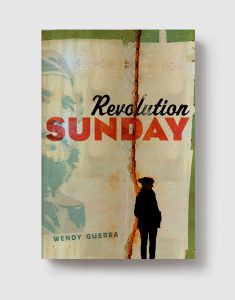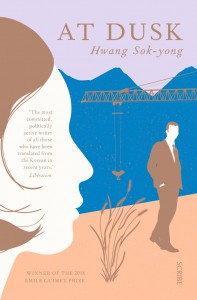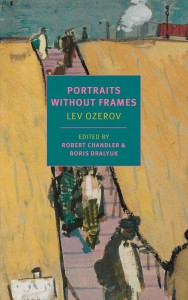Just like that, the final weeks of 2018 are upon us. You might be looking for Christmas gifts, or perhaps some respite from the stress of the festive season, or maybe for something new to read! We have you covered here in this edition of What’s New in Translation, with reviews by Asymptote staff of three fresh titles from Wendy Guerra, Hwang Sok-Young, and Lez Ozerov.

Revolution Sunday by Wendy Guerra, translated from the Spanish by Achy Obejas, Melville House, 2018
Reviewed by Cara Zampino, Educational Arm Assistant
“What is left after your voice is nullified by the death of everything you ever had?” asks Cleo, the narrator of Wendy Guerra’s Revolution Sunday. Set in the “promiscuous, intense, reckless, rambling” city of Havana during the restoration of diplomatic relations between the U.S. and Cuba, Guerra’s genre-defying book explores questions of language, memory, and censorship as it intertwines images of Cleo, a promising but controversial young writer, and Cuba, a country whose narratives have long been controlled by its government.
Expressing herself in a hybrid of lyrical styles, Guerra fuses poetry and prose to track the hallucinatory lives of both her protagonist and her country. The book begins after the loss of Cleo’s parents in a suspicious car accident, which causes Cleo to spiral into depression that is eventually mitigated by a phone call from a Spanish publisher, who invites her to Barcelona to receive an award for her poetry collection. The award ignites both increased surveillance from the state police and a series of travels to Spain, Mexico, the U.S., and France. Amidst a frenetic start to her literary career, Cleo confronts her family’s contentious past, becomes involved with a famous U.S. actor who claims to be making a film about her father, and watches Barack Obama tell Cubans that the thawing of the two countries’ relations “no es fácil” (won’t be easy).
Described by a friend as a “naïve survivor,” Cleo nevertheless resists manipulation by the Cuban government as she attempts to document contemporary Havana without “getting her pages dirty.” In other words, Cleo aspires to inhabit the elusive interstices between difficult truths and necessary inventions, between life “here” on the island and “there” outside; sometimes, between life and death itself. Take, for example, the evening she invites her family’s informer, Alberto, to her home. She extends this invitation despite a police raid earlier in the day and her self-professed inability to “shut up when [she] needs to find out something.” Even her housekeeper, Márgara, warns her that Alberto “has always been after [Cleo’s] bones,” but Cleo remains resolute in her decision. “Every one of us has a book to write,” she says, “that’s the only way to beat the silence to which Cuba confines its recent history.”
As much as she champions remembrance, Cleo also defends amnesia through equal parts poetry and Havana Club rum. In a poem titled “What is Winter,” she writes, “I punish the body: remember remember remember but / forget / Please forget a little go on / try to forget this.” Referencing unnamed encounters, her poetry attempts to evade repercussions from the government while simultaneously revealing the existence of multiple possible realities. Throughout the book, bodies of people, water, and countries become entangled as swiftly as memories are muddled, doubted, and abandoned. “Little by little, I feel Cuba leave my body,” Cleo muses en route to France. “Little by little, I scatter . . . ”
Mirroring the Cuban diaspora, personal and political events are dispersed across the book’s varying geographic sites. Guerra dips fluidly in and out of stifling scenes in Cleo’s home, extravagant parties in Havana mansions, contrived gatherings on Mexico City terraces, silent walks down the Cannes red carpet, unfiltered conversations in Brooklyn apartments . . . all of which are narrated by an “I” that becomes less stable as the plot progresses. According to Cleo, “a name can replace another, a photo can replace another, but by the end of the night, there’s just a pastiche of memories that confuses you and hinders your mind.” In Revolution Sunday, memory is not fragmentary; it is a potpourri of cinematic scripts, an attempt to laugh in the face of pain.
Achy Obejas’s translation deftly reproduces the searing and ethereal quality of Guerra’s voice, one that is ultimately in pursuit of liberation from the confines of politics and fear. Revolution Sunday transits between alienation and globalization, state surveillance and private rendezvous, Hollywood fantasies, and everyday life—in the process, Guerra writes a world where there is no escape from the potency of her poetics.

At Dusk by Hwang Sok-Yong, translated from the Korean by Sora Kim-Russell. Scribe Publications, 2018.
Reviewed by Barbara Halla, Editor-at-Large for Albania
What are the personal and societal costs of one man’s rise to wealth and power? In At Dusk, Hwang Sok-Yong (translated by Sora Kim Russell and published by Scribe) outlines the rise and emotional downfall of Park Minwoo, the rich and rather famous director of a large architectural firm. But the life of Park Minwoo is not only about the man himself—it is used as a window into almost fifty years of Korean history, from the Korean War to the present, and the pitfalls of modernisation, pushing us to reconsider what progress means and at what cost it is achieved.
As the book begins, Park Minwoo is approached by an anonymous young woman after a conference where he was the key speaker. She hands him a letter with a name (Cha Soona) and a phone number, the name of someone Park Minwoo thought he had left behind. This chance encounter begins a spiral into his old life, as memories begin to assail him: his rural childhood in Yeongsan; the painful move to Moon Hill in the outskirts of Seoul where his family took up a stand frying fishcakes to survive; the neighbours who taught him how to box; the struggle to get out of the slums through rigorous studies; his eventual success as an architect, and still, the constant pull that the slum holds on him.
A large portion of the book is told from Park Minwoo’s perspective, and yet there is a rich cast of characters that populate his narrative. Several of them serve as a foil, or a catalyst for Park Minwoo’s doubts, of the way he is beginning to re-interpret his life after that random meeting. His dying friend, Kim Kiyoung, a less successful but more morally conscious architect, pushes back against Park Minwoo’s idea of success. “Is there really any humanity in architecture?” he asks. “If there were, you’d have to regret what you did. You and the others at Hyeonsan need to think on your sins.” It is true that South Korea’s modernization has pushed many families out of their homes, transformed villages with their own personalities into mere extensions of cement-full cities. This thought begins to weigh on Park Minwoo throughout the book.
With Kim Kiyoung’s death, a corruption scandal that threatens to destroy all he has worked for, and a rekindled communication with Cha Soona, his teenage sweetheart, Park Minwoo begins to re-think his life. He re-visits Yeongsan only to realize that he is unable to distinguish it from any other such village. He is unable even to find the precise location of his childhood home. He realizes that if he has succeeded in life it was not merely because of his hard work, but also his decision to hide in “habitual resignation,” choosing to protect himself, over choosing to fight for social justice like many of his contemporaries. In his youth he had believed his resignation to be simply maturity. With things brought to a new light, his success appears fragile, and he begins to think that:
We drove our neighbours into a space of distorted desire. Architecture is not the destruction of memory, it is the delicate restructuring of people’s lives on top of a sketch of those memories. We have already failed horribly at achieving that dream.
Park Minwoo’s narrative is interlaced with Cha Soona’s own memories and a few aggressive chapters told from the perspective of a young woman, Jung Woohee. Jung Woohee is a screenwriter of little success who makes most of her living by working the night shift at a convenience store and who lives in a tiny apartment taken over by mold and humidity that makes her sick. She seems to represent the victims of the rapid modernisation that Park Minwoo’s generation has engineered. The reader might be perplexed at first, trying to piece together these three strands. But anyone who picks up At Dusk should rest assured: Hwang is a master storyteller and once it all starts to fit together, a larger story appears, an even more satisfactory one.
And Hwang is not just a master storyteller, one of South Korea’s most renown voices; his writing is sparse and evocative. You want to keep reading just for the pleasure of the writing. This, of course, is all rendered in Sora Kim-Russell’s brilliant translation that had me highlighting passage after passage, together with smaller, less significant sentences that evoke a great longing: “When it rained, everyone stayed in their narrow rooms, and the neighbourhood grew quiet. With the sound of raindrops sliding down the roof and dripping from the eaves, a sweet sleepiness would wash over me.” And this exactly what most of this book does: it washes over you.

Portraits without Frames by Lev Ozerov, translated from the Russian by Maria Bloshteyn, Robert Chandler, Boris Dralyuk, and Irina Mashinski, New York Review Books, 2018.
Reviewed by Andreea Scridon, Assistant Editor
The name Lev Ozerov may strike non-connoisseurs of 20th century Russian literature as an atypical choice on the part of the New York Review of Books Publishing House, which in this same “Classics” collection has published Tsvetaeva, Pasternak, and Mandelstam. It’s no wonder: leafing through, we realize at first glance that beyond his own capacity of poet, editor, and translator, this Ozerov is singular in his position of witness.
To put it shortly, Portraits without Frames is a collection of “homage poems” to the writers, visual, and performance artists who Ozerov interacted with. Ozerov’s ambitious scope creates an encompassing elegy to what is a Russian lost generation—nothing similar seems to exist for the quintessential Anglophone Lost Generation, the contemporaries (albeit, in a different world) of those figures Ozerov depicts.
Although the poems themselves are interesting, the work’s primary merit is in its contribution to the genre of literary history. One gets the impression that Ozerov himself would agree, given that this narrator clearly feels comfortable in the position of observer-poet, deliberately taking little poetic license with a lived experience. They are fundamentally lucid, and embellishment is sparse. Thus, the interest lies not in the formal worth of the poems, but their ability to bring up questions. What does poetry do that an obituary would not?
Overall, quality varies. Some poems are too obvious, too lacking in artifice. A poem about Babel is somewhat discolored, while “Ilya Lvovich Selvinsky” is powerful to the point of trauma. The posthumous translation, for this reason, is valuable. Perhaps a contemporary poet would have chosen to dissect that which is disturbing via the mundane, but Ozerov does not shy away from the terrible—the outraged widow, for instance, is a unanimous trope that reappears, most “collective” of all.
Perhaps one reason for some poems’ superiority to others is Ozerov’s limited allowance for artistry, making writing an elegy difficult to begin with. Paradoxically, because of that limited artistry that Ozerov balances in varied ways: my high expectations impeded me from loving a poem about Akhmatova, I came to feel that I knew “Nikolay Alexeyevich Zabolotsky” myself. “He was considered a goner,/but his family needed him/and his friends needed him/and literature needed him.” Ozerov is best when he takes a step back, when he recognizes the incongruity, true to form, of his own memory.
Beyond portraiture, Ozerov succeeds in a secondary intention. He creates a natural sense of place by using imagery that allows the reader to imagine his scenarios independently. He doesn’t go into excessive detail: the “black soot-covered icicles/-prisoners’ popsicles” establish a context. Moreover, this atmospheric element translates an impression of the Russian spirit: Yury Olesha is described as “intimately” knowing the stars in the night sky “not only by surname/but even by first name.” One of the best poems in the collection, “Georgy Arkadievich Shengeli,” chronicles a chance meeting between a poet and an admirer under an overhang in a rainstorm. As the admirer recites the poet’s verses by heart and as the poet fumbles in his briefcase for a book to sign, the reader is privy to an attitude of cordiality and sincerity less encountered in our 21st century. Moreover, it is not so much that Ozerov and his subjects are sensualists, but rather that these piquant places are the natural surroundings in which they have developed: “He loved/to wander amid bowls and pots,/ amid the luscious crunch of fresh, /crisp cabbage, /hissing braziers,/ silvery herring, big copper tubs,/and golden melons—/greens, sandy yellows, blues.” For an Eastern European reader, in particular, the idiosyncrasies of Soviet-style corruption are visible today: “Well-wishers had ensured/that all of us/languishing in the hospital/had a clear grasp/of the system of bribes:/so much for a cataract,/so much for a glaucoma,/so much for a scratched lens,/so much for a detached retina—/each item on this list, of course,/more expensive/than the item before it.”
There isn’t much to say about the translation beyond that it is excellent. Never does a poem lose its essential spirit. It’s difficult enough to co-translate a book, much less group-translate. This requires the sacrifice of complete invisibility—or, better, of transparency. It is notable that it is a very approachable translation, quite neutral and modern.
Written in the 1990s, Portraits without Frames was of the last things Ozerev, surrounded by phantoms, would write, and he knows it fully. Au fond, it isn’t difficult to agree with someone who is fundamentally a firm believer in the cult of friendship. Remembrance is the best we can offer to those we hold dear, and more, to those who have made us feel in exceptional circumstances.
*****
Read more reviews on the Asymptote blog:

